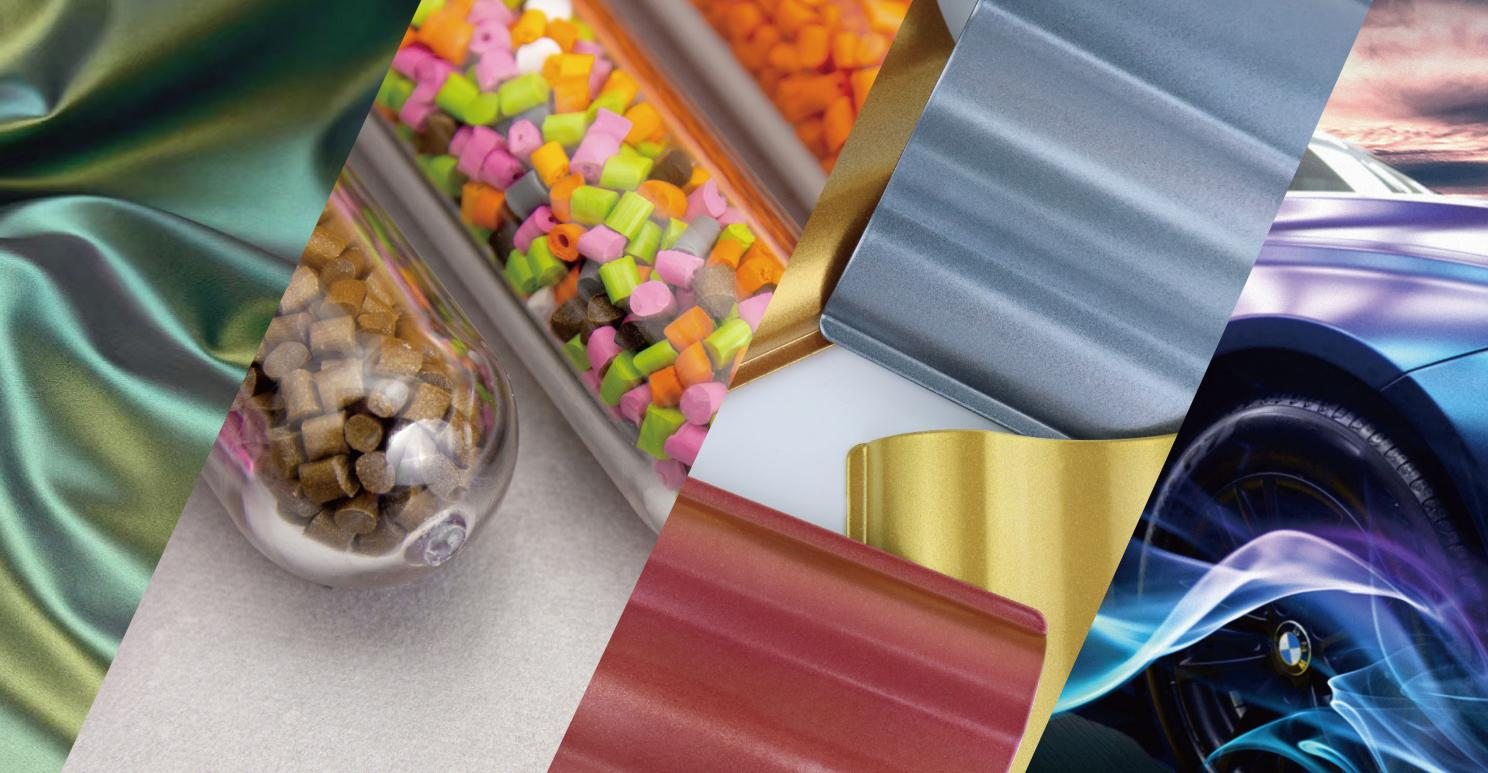Konwencjonalne pigmenty pokryte kolorami są istotnymi elementami w różnych branżach, oferując zarówno estetyczne atrakcyjność, jak i korzyści funkcjonalne. Od sektora motoryzacyjnego po materiały budowlane, a nawet opakowania, pigmenty te odgrywają kluczową rolę w kształtowaniu wyglądu, trwałości i wydajności niezliczonych produktów. Wartość, którą dodają do produkcji, jest niezaprzeczalna, a zrozumienie ich wszechstronności jest kluczem do dokonywania właściwych wyborów dla określonych aplikacji. W tym artykule zbadamy, w jaki sposób konwencjonalne pigmenty pokryte kolorami służą branżom, zapewniają trwałe wyniki i podnoszą wydajność produktu.
W branży motoryzacyjnej konwencjonalne pigmenty pokryte kolorami są szeroko stosowane w produkcji powłok pojazdów. Odwołanie koloru to dopiero początek. Pigmenty te oferują znaczące korzyści pod względem odporności na UV, odporności na zarysowania i ogólnej trwałości. Wraz ze wzrostem popytu konsumentów na wysokiej jakości wykończenia, które wytrzymują elementy, producenci muszą wybrać pigmenty, które nie tylko wyglądają świetnie, ale także chronić przed zanikaniem, korozją i zużyciem środowiska. Konwencjonalne pigmenty pokryte kolorami spełniają te kryteria, zapewniając żywe i długotrwałe wyniki, co czyni je wyborem dla producentów motoryzacyjnych na całym świecie.
Podobnie w sektorze budowlanym pigmenty te są używane w farbach, powłokach i produktach betonowych, aby poprawić zarówno estetykę, jak i długowieczność budynków i konstrukcji. Powleczone pigmenty mogą pomóc chronić powierzchnie przed wilgocią i ekspozycją na środowisko, co jest szczególnie kluczowe w obszarach podlegających trudnym warunkom pogodowym. Uwzględniając te pigmenty, producenci mogą zapewnić, że produkty końcowe są odporne na zanikanie, pękanie i przebarwienia. Konwencjonalne pigmenty pokryte kolorami są idealne do zastosowań, które wymagają zarówno atrakcyjnego wizualnie wykończenia, jak i solidnej wydajności w czasie.
W dziedzinie tekstyliów konwencjonalne pigmenty pokryte kolorami są używane do osiągnięcia żywych i spójnych kolorów w tkaninach, barwnikach i druku. Pigmenty te są faworyzowane ze względu na ich zdolność do utrzymania integralności po wielu zmywach, oferując doskonałą szybkość kolorów i odporność na zanikanie. Niezależnie od tego, czy jest używane w modzie, tapicerce czy tekstyliach technicznych, pigmenty z powłokami pomagają tworzyć tkaniny, które utrzymują ich bogate kolory i tekstury. Ich zastosowanie rozciąga się również na włókna syntetyczne, w których trwałość i elastyczność koloru są kluczowe dla utrzymania wysokiego standardu jakości.

Przemysł opakowań to kolejny obszar, w którym konwencjonalne pigmenty pokryte kolorami wywarły znaczący wpływ. Producenci w sektorze opakowań w dużej mierze polegają na kolorze marki, atrakcyjności konsumenckiej i różnicowania produktów. Niezależnie od tego, czy jest to w postaci butelek, etykiet lub pojemników, pigmenty te są niezbędne w tworzeniu wizualnie uderzających opakowań, które mogą stać na rygorach transportu, obsługi i przechowywania. Zdolność konwencjonalnych pigmentów pokrytych kolorami do wytrzymania ścierania i czynników środowiskowych sprawia, że idealnie nadają się do materiałów pakowania, które muszą zachować zarówno wygląd, jak i siłę.
Oprócz ich stosowania w branżach konsumenckich, pigmenty te pełnią również krytyczną rolę w zastosowaniach przemysłowych, takich jak powłoki do materiałów metali, plastiku i materiałów ceramicznych. Powłoki stworzone z konwencjonalnych pigmentów pokrytych kolorem zapewniają dodatkową warstwę ochrony, pomagając zapobiegać korozji i degradacji materiału podstawowego. W branżach takich jak lotnisko i elektronika, w których precyzja i trwałość są najważniejsze, odpowiednia powłoka pigmentu może poprawić zarówno funkcjonalność, jak i długowieczność komponentów, zmniejszając potrzebę częstego naprawy lub wymiany.
Ponadto konwencjonalne pigmenty pokryte kolorami mogą być dostosowane do określonych właściwości funkcjonalnych, takich jak oporność w wysokiej temperaturze lub stabilność chemiczna, czyniąc je cennymi w wyspecjalizowanych dziedzinach, takich jak produkcja części maszynowych i narzędzi przemysłowych. Wszechstronność tych pigmentów pozwala producentom tworzyć produkty, które spełniają wymagane standardy wymagane w branżach, w których nie można zagrożić wydajności.
Jeśli chodzi o względy środowiskowe, wielu producentów coraz częściej szuka zrównoważonych rozwiązań. Konwencjonalne pigmenty pokryte kolorami nie są wyjątkiem. W branży odnotowano znaczący postęp w tworzeniu ekologicznych alternatyw, z ulepszonymi metodami produkcji, które minimalizują zużycie odpadów i energii. Ponadto trwałość i długa żywotność produktów przy użyciu tych pigmentów przyczyniają się do rzadszych zastępowania, zmniejszając ogólny ślad środowiskowy. Wybierając wysokiej jakości pigmenty, producenci nie tylko ulepszają swoją ofertę produktów, ale także są zgodne z rosnącym popytem konsumentów na zrównoważony rozwój.
Podsumowując, konwencjonalne pigmenty pokryte kolorami są czymś więcej niż tylko cechą kosmetyczną w produktach; Są integralną częścią ich funkcjonalności, długowieczności i atrakcyjności w wielu branżach. Od motoryzacyjnej po budowę, tekstylia po opakowania, pigmenty te oferują praktyczne i wizualne korzyści, na których producenci mogą polegać. Wybierając odpowiednie pigmenty, firmy mogą podnieść swoje produkty zarówno pod względem wyglądu, jak i wydajności, zapewniając, że spełniają rygorystyczne wymagania dzisiejszych rynków. Jeśli szukasz pigmentów, które zapewniają spójną jakość i wszechstronne zastosowania, konwencjonalne pigmenty pokryte kolorami oferują idealne rozwiązanie dla szerokiej gamy branż.

